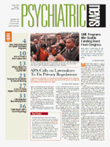Medicare funds targeted to support graduate medical education (GME) have been an easy mark for congressional budget cutters in recent years, but a December vote by these federal lawmakers signals that they realize they may have gone too far.
Before they passed the Fiscal 2001 budget, members of Congress agreed to restore about $700 million they had previously agreed to strip from Medicare’s GME line item and added another $300 million to boost this year’s support level over $1 billion. The new dollars will be spread over two years.
Funds had been cut so deeply that many of the nation’s teaching hospitals—where new doctors learn to treat some of the sickest patients and most complex illnesses—were confronting fiscal crises that boded ill for their future and thus the future of medical training in the U.S.
“Every teaching hospital in the country is facing serious shortfalls in GME funding,” said Deborah Hales, M.D., director of the APA Department of Education and Career Development and immediate past chair of APA’s Committee on Graduate Education. “APA is very happy to see that Congress is addressing these shortfalls. We hope that this will be just the first step in a comprehensive Congressional approach to increasing and solidifying GME funding in the U.S.”
Another area that came out well in the Medicare budget debates was freestanding children’s hospitals with residency training programs. These 60 or so hospitals have a graduate medical education component but are not affiliated with a medical school. Congressional budget mavens favored these institutions with an increase of $235 million, which boosted the total well beyond what the Clinton administration had proposed spending this fiscal year. This is the second year in a row that Congress gave the administrators and staff of these children’s hospitals something to smile about. As part of last year’s budget allocation, the Clinton administration successfully urged Congress to approve $40 million to support the teaching and research missions of these facilities. As a result of severe cutbacks in funds controlled by managed care organizations, these programs had been devastated by rapidly shrinking budgets (Psychiatric News, March 17, 2000).
Freestanding children’s hospitals treat very few Medicare patients and thus are not eligible to be reimbursed through the same pot of Medicare money that supports residency training programs at other teaching hospitals. They had to resort to various fundraising efforts to help pay for their graduate medical education programs.
In advocating funding for this program in 1999, Clinton pointed out that nearly 50 percent of pediatric specialists receive training at these children’s hospitals, as do 30 percent of general pediatricians. ▪
